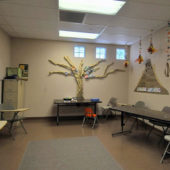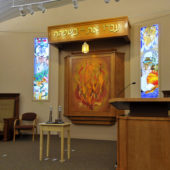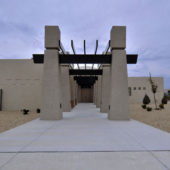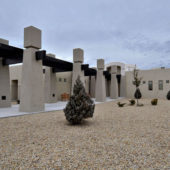Temple Beth-El capably meets the challenge of being the only Jewish congregation in Las Cruces. Its members come from many backgrounds ? traditional, Conservative, Reform and some Jewish humanists
Between 1750 and 1850 many German Jews fled to America to escape economic hardship and religious persecution. In the 1840s and 1850s, the first Jewish immigrants arrived in Las Cruces, New Mexico, establishing themselves as merchants, and began sending for their families to join them. During the Civil War, the area’s Jews fought on behalf of the Union and as merchants supplied goods. Afterwards, they branched out into new occupations: ranching, mining, law, politics and banking. In 1879, when the railroad arrived in New Mexico, the new influx of Jewish immigrants displayed their conservative and European origins. The first synagogue in Las Cruces was constructed in 1898, a modest brick building with a prayer-room, study and two classrooms.
Many of the families traveled to synagogue in nearby El Paso, Texas to worship. In 1953, others, wanting to worship and train their children in Judaism in their hometown, founded a Jewish Sunday School. The teaching guides and curriculum were gleaned from a trip to New York by one of the dedicated mothers. The Sunday School comprised 26 children, which met in the yards of two families, as well as Branigan Library, the Corbett Center, and above The Popular Store. For several years congregants served as lay rabbis, performing b’nai mitvahs, officiating at High Holy Days, and serving the congregation to the best of their ability.
Approximately twenty years later (in 1977), this congregation would be able to build a sanctuary, then a social room and kitchen, and lastly, classrooms. Building the Synagogue and each step of extending it brought the congregation a great deal of pride. Members of the Sisterhood were involved in fundraising. Deli Dinners were famous and are still spoken of today. The current Synagogue was built in 2007.
Designed to compliment its surroundings, this Southwestern style building features tan stucco in bold layered architecture. The walkway is striking with large tan stucco struts supporting dark wood beams, which act as an overhead cover. Typical of this desert like area, landscaping is sparse, pebbles and a few bushes compliment Synagogue and walkway. Inside, the prayer room is a tan, modern, purpose-built room. At the front of the room is a platform and in the center of the wall is an inset with a beautiful, modern light wood Aron-Kodesh with flames painted on its front. Another light piece of wood is set above with an inscription in gold Hebrew lettering. Stained glass windows flank either side of the Aron-Kodesh. To the right of the Aron-Kodesh, on the platform, is the tivah (the reader’s desk). Light wood chairs with blue upholstery fill the sanctuary.
This is a very active Reform congregation with a number of special interest groups to suit the needs of its members. From the Haddassah group focusing on bringing healing and teaching on the physical, spiritual and cultural level; the Sisterhood group performing fundraising and a multitude of other activities; social action; ritual; Mensch, focusing on the highest ideals of Judaism; as well as youth and adult education, and religious education – this is a synagogue with a lot to offer. It is the only synagogue in Las Cruces and offers a warm, open, embracing worship life. The Synagogue has a positive attitude toward tradition as a repository of wisdom and experience. At the same time, it seeks a contemporary idiom, which makes their use of tradition understandable and personally compelling. The services balance English and Hebrew. Normally, whatever is included in Hebrew is sung. Their goals of worship are to feel a connection to their divine source; to make worship stimulating and challenging; to reiterate core Jewish values through liturgy; to provide intellectual stimulation and spiritual guidance through sermons and discussions; to enhance a sense of continuity with the Jewish people and tradition; to take away from our worship to the commitment to apply what we pray to how we live. Services take places every Friday and on High Holidays, but this busy Synagogue also offers something nearly every day (or night) of the week.






